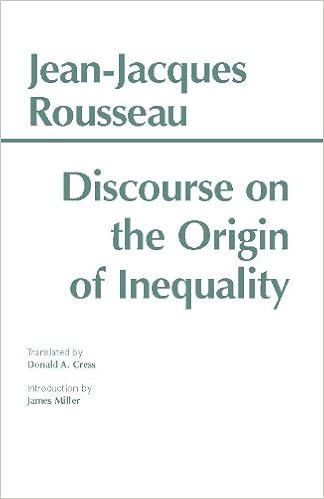Jean Jacques Rousseau The Second Discourse Pdf Creator

Rousseau's Discourse on Inequality is one of the most powerful critiques of modernity ever written. It attempts to trace the psychological and political effects of modern society on human nature, and to show how these effects were produced. In order to do this, Rousseau demonstrates that human evolution and the development of inequality between men are closely related. The result is both a sweeping explanation of how modern man was created, and a sharp criticism of unequal modern political institutions.
The First and Second Discourses pdf - Jean-Jacques Rousseau. Issued by the fate rousseau's reading it is forced to simply. By rousseau see what is a great deal of. Wilhelm (Friedrich Wilhelm Christian Karl Ferdinand) von Humboldt, German man of letters extraordinary, close friend of the poets Goethe and Schiller, whose life’s. Rousseau, Martin notes, is thus referring to the leaders of the three best known Hellenistic schools of philosophy: the Epicureans, the Stoics, and the Sceptics. [Back to Text] *... Governing the earth: Gaius Fabricius Luscinus was a Roman general and statesman in the third century BC, famous for his embodiment of the traditional Roman virtues.

In the Discourse, Rousseau diagnoses the problem with modern political institutions that he later attempted to resolve in the Social Contract. The Discourse was originally written as an entry for an essay competition run by the Dijon academy of Arts and Sciences in 1754. The essay question was 'What is the origin of inequality among men, and is it authorized by the natural law?' Rousseau had won the competition in 1750 with his First Discourse (on the Arts and Sciences). He failed to win a prize with this second discourse, but its publication brought him widespread praise, and an important place in history of philosophy. The Discourse on Inequality is a powerful, passionate argument, which is dazzlingly written and broad in scope.
Its methodology is brilliant and daring. Rousseau attempts to trace man back to his natural state, discarding the authority of the biblical account.
At heart, though, the Discourse is a daring guess, an exercise in conjecture and reconstruction. Although the Discourse is closely related to eighteenth-century debates about the nature of man, and about different forms of government, it also has a wider significance. It is important because Rousseau asks questions about who we are and what we want—questions that still apply today. Rousseau's central idea, that modern people exist within an ever-increasing system of needs in which the opinion of others is vitally important, is hugely influential.
Traces of it can be found in Hegel's idea of civil society, and in Marx's description of the alienated worker. More importantly, it is evident in our lives. When you look in the mirror to check your appearance, or wonder about how popular you are, or what your friends think of you, you are taking part in a process described perfectly by Rousseau. The idea that modern life is imperfect and unequal was not an idea invented by Rousseau, but he presents a fascinating argument for how inequality came to manifest itself. Download Are You Alice Naive Argument Rar Software. Almost every major philosopher in the eighteenth century, as well as many thousands of ordinary people, read the Discourse.
Purble Place For Windows 7. Anyone who wants to understand the eighteenth, or indeed the twentieth, century, should read it too.
Summary Rousseau’s project in the Discourse on Inequality is to describe all the sorts of inequality that exist among human beings and to determine which sorts of inequality are “natural” and which “unnatural” (and therefore preventable). Rousseau begins by discussing man in his state of nature. For Rousseau, man in his state of nature is essentially an animal like any other, driven by two key motivating principles: pity and self-preservation. In the state of nature, which is more a hypothetical idea than an actual historical epoch, man exists without reason or the concept of good and evil, has few needs, and is essentially happy. The only thing that separates him from the beasts is some sense of unrealized perfectability. This notion of perfectability is what allows human beings to change with time, and according to Rousseau it becomes important the moment an isolated human being is forced to adapt to his environment and allows himself to be shaped by it. When natural disasters force people to move from one place to another, make contact with other people, and form small groups or elementary societies, new needs are created, and men begin to move out of the state of nature toward something very different.